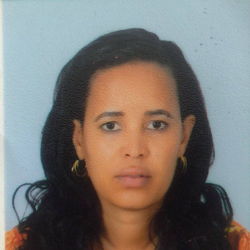Short Bio:
Bayoush Birke Yeshingus (MSc) is an Associate Researcher and Plant Pathologist at the Ethiopian Institute of Agricultural Research (EIAR), with eight years of research experience in the field of plant protection, particularly in plant pathology. Earlier in her career, she served as a Junior Agronomist and Expert for oil and fiber crops in the Crop Directorate of the Ministry of Agriculture and Natural Resource Management of Ethiopia. She has also received international training in South Korea, specializing in the diagnosis, identification, control, and integrated pest management (IPM) of plant pests and diseases. Bayoush currently leads a biopesticides research project as the Principal Investigator, titled “Formulation and Evaluation of Biocontrol Agents Against Fusarium Wilt on Chickpea,” with a specific focus on the use of Trichoderma bioagents. Her Master’s thesis research was dedicated to the integrated management of Fusarium Head Blight (FHB) of wheat using biocontrol agents, and she has published research articles in this area. In addition to her research roles, Bayoush is an African Women in Agricultural Research and Development (AWARD) Fellow and a recipient of the One Planet Fellowship, prestigious programs that empower African agricultural researchers and climate scientists to become influential leaders in their fields. Currently, she has also joined the Ministry of Agriculture, working as a Plant Pathologist Expert in the Farming and Horticulture Sector under the Plant Protection Section. In this role, she contributes her expertise in plant health management, biocontrol strategies, and sustainable agricultural practices. Bayoush’s research interests focus on the development and application of environmentally friendly biocontrol agents to improve plant health, enhance crop productivity, and strengthen national food security and economic growth. She is particularly passionate about advancing sustainable plant protection practices through plant pathology research, integrated pest management, and the implementation of effective phytosanitary measures.Bayoush Birke Yeshingus (MSc) is an Associate Researcher and Plant Pathologist at the Ethiopian Institute of Agricultural Research (EIAR), with eight years of research experience in the field of plant protection, particularly in plant pathology. Earlier in her career, she served as a Junior Agronomist and Expert for oil and fiber crops in the Crop Directorate of the Ministry of Agriculture and Natural Resource Management of Ethiopia. She has also received international training in South Korea, specializing in the diagnosis, identification, control, and integrated pest management (IPM) of plant pests and diseases. Bayoush currently leads a biopesticides research project as the Principal Investigator, titled “Formulation and Evaluation of Biocontrol Agents Against Fusarium Wilt on Chickpea,” with a specific focus on the use of Trichoderma bioagents. Her Master’s thesis research was dedicated to the integrated management of Fusarium Head Blight (FHB) of wheat using biocontrol agents, and she has published research articles in this area. In addition to her research roles, Bayoush is an African Women in Agricultural Research and Development (AWARD) Fellow and a recipient of the One Planet Fellowship, prestigious programs that empower African agricultural researchers and climate scientists to become influential leaders in their fields. Currently, she has also joined the Ministry of Agriculture, working as a Plant Pathologist Expert in the Farming and Horticulture Sector under the Plant Protection Section. In this role, she contributes her expertise in plant health management, biocontrol strategies, and sustainable agricultural practices. Bayoush’s research interests focus on the development and application of environmentally friendly biocontrol agents to improve plant health, enhance crop productivity, and strengthen national food security and economic growth. She is particularly passionate about advancing sustainable plant protection practices through plant pathology research, integrated pest management, and the implementation of effective phytosanitary measures.

